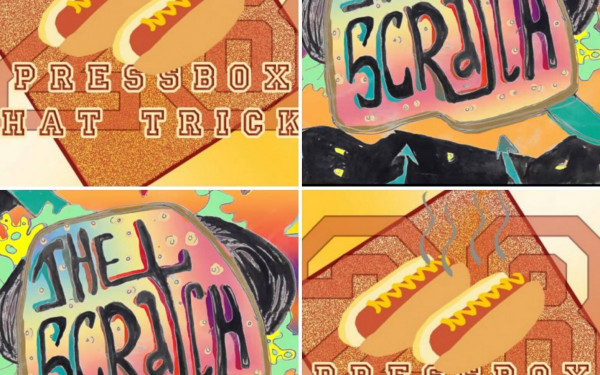Montreal Hip Hop Scene Combines Rap with Altruism
French Rapper K.O.F. Divides His Time Between Collaboration and Community
The ultra-commercialization of big beat hip-hop by US major labels leads many to forget that this genre of music is primarily a vehicle for social change and positivity—uniting oppressed minorities within a single mode of art.
“Rap was my only pain therapy,” said K.O.F., who has been on the hip-hop circuit in Montreal for three years now. “It allowed me to gain balance in my life.”
K.O.F. recorded several mixtapes and an album, which were released on the underground scene in France, where he was based in Perpignan. His mother had carried him through pregnancy from Côte d’Ivoire to France before returning to his country of origin until he was 6, and he came to Montreal to escape the confines of the Parisian hip-hop scene that he felt was mentally and spiritually restrictive.
“I’ve been a rapper since I was 15 years old, so that’s 15 years of hip-hop, and I came here for a new start,” K.O.F. told me. “Paris is too aggressive for me. I’m all about vibes and I love the open mind of the musicians and MCs in Montreal.”
Choosing to not pursue a personal project at the moment, K.O.F. divides his time between volunteering as a youth worker—holding workshops on music and hip-hop and working in the studio at the Maison des Jeunes de la Côte des Neiges—and collaborating with local artists and producers such as Clay and Friends and Wood Holly, while performing live with the Kalmunity Vibe Collective and Le Cypher.
“I work with everybody I like,” said K.O.F. as he explained the current stage in his career. “Kalmunity are like family to me. It’s improvisation but with rules as we try to make songs on stage.”
Throughout the past few weeks I’ve seen K.O.F. perform throughout Montreal alongside a variety of other artists at Les Bobards, Le Bluery Bar à Vinyle and Divan Orange.
He seems to have an insatiable longing to articulate his feelings and his experiences into rhymes. As he makes me tea he freestyles, he leans down to his daughter and sings, and when he meets local youth he’s keen to help them refine their skills.
Dressed down in a tee, jacket, outdated Nike pants and beaten sneaks, K.O.F. turns up to a venue accompanied by young beatboxing protégé Anand, greets his collaborators and fellow musicians with a characteristic enthusiasm and takes in the space, swaying to the DJ’s tune and wiling out to the opening act in an underpopulated bar.
“If I have an idea to create the lyrics around colonization or pain, then every musician or vocalist follows … and the other vocalist is working with me to try and build a song,” he explained. “That’s sharing, sharing ideas and trying together to build improvised songs.”
Accompanied by his young daughter, K.O.F. volunteers during the weekend through the label he runs, NO BAD SOUND, at a youth centre in Côte-des-Neiges—open to the public on Sundays—where he supervises activities while creating beats and crafting rhymes with young artists such as Tombs.
This weekend they held a day-long workshop alongside Canadian Roots on decolonization, where songs and art—which shall be showcased on installations on bus shelters—was created in an effort to bridge the gap between indigenous youths of Kahnawake and Côte-des-Neiges. The attendees displayed their various talents and discussed their origins with K.O.F. and others alike.
On hip-hop in Montreal, K.O.F. says, “We’re not popular.
“The people I know are great musicians and hard workers but it’s still underground. They’re not in the mass media … I don’t know a lot of people making real money in hip-hop. They’re playing shows and they are close to the people.”
The venues where K.O.F. raps gradually fill up as the night progresses. The attendees haven’t come to see him; they’ve come for a night out at a bar they like before excusing themselves around 12:30 a.m. Only a sparse collection of revelers remains.
But when he jumps onstage to feature with Clay and Friends, everyone hushes as they wave their arms and pound their feet to the beat.
3_900_600_90.jpg)
“I don’t care about making money in music; that’s why I don’t have my own project.” -K.O.F.
“I don’t care about making money in music; that’s why I don’t have my own project,” K.O.F. said of his outlook. “I care about making good music and being with the people I like to build something to feed the soul, and my soul in particular.”
He might not intend to, but K.O.F. overshadows the rappers he collaborates with, albeit with a refreshing humility. He touches the mic and people take notice immediately.
Though he and his partner are hoping to gain Canadian citizenship, K.O.F. hopes to return “home” to Côte d’Ivoire in the foreseeable future.
“I do the things I like with the people I like and that’s the best for me,” he said. “I’m happy. Sometimes I need money like everybody but I really enjoy my life.”
Check out K.O.F.’s Soundcloud at https://soundcloud.com/kofrider and catch him live at Les Bobards on Tuesdays or Bar Vinyle de Bleury on Thursdays

1_900_600_90.jpg)
2_900_600_90.JPG)



_600_375_90_s_c1.jpg)